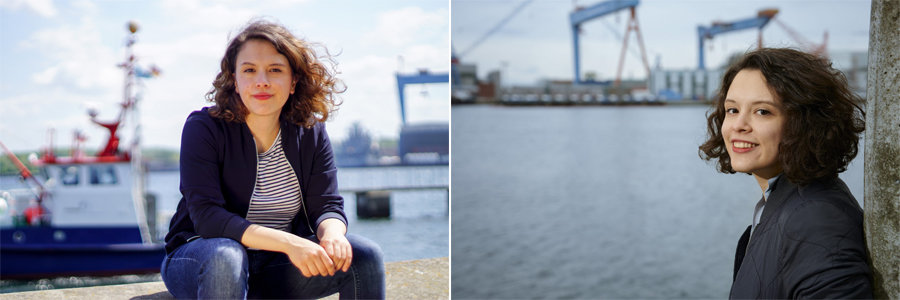Delara Burkhardt, a young politician from the Baltic Sea region, shares her views on future Interreg programmes and the impacts of the pandemic on cooperation. As a Member of Parliament, she pushes environmental and migration policies for the benefit of Schleswig-Holstein she comes from, and the whole Baltic Sea region.

© Picture on the left: Marc Fricke & picture on the right: Bernd Marzi
Delara Burkhardt is a member of the Sozialdemokratische Partei Deutschland (SPD). Since 2019, she has been Member of the European Parliament. She joined the Group of the Progressive Alliance of Socialists & Democrats in the European Parliament.
New Interreg programmes for 2021-2027 are under preparation. Do you have a particular wish for them?
Delara Burkhardt: The economic recovery of our continent after the Corona crisis can only succeed if the programmes that are now being launched have a clear social-ecological focus. The new Interreg programmes can and must make an important contribution here, because just as climate change does not stop at borders; our efforts to protect the climate and the environment must be thought about and implemented across borders, too.
Which of the pressing challenges in the Baltic Sea region do you think Interreg cooperation could help most with?
With cooperation beyond borders, Interreg can help the participating partners in the Baltic Sea region to build even closer ties. This is especially important in the area of the socio-ecological transformation. Joint, innovative projects are needed here, for example in the development of the green hydrogen infrastructure. The Baltic Sea region is characterised by its high amount of wind-power being produced – so the conditions could not be better in this regard. In this way, the Baltic Sea region could also become a model region for the rest of Europe.
Interreg is a very diverse funding scheme that offers possibilities for cooperation big and small, on various topics, beyond and across borders. What do you think the benefit of this diversity is?
Due to its diverse funding scheme, Interreg can be perfectly adapted to the diverse conditions that exist in the border regions of the European Union: while some borders are densely populated and characterised by large companies; other regions are more rural with a higher density of small and medium-sized enterprises – as in the case of the German-Danish border region. For me, the wide range of funding opportunities means that all these regions can be supported equally and innovative patterns of cooperation do not depend on where you live.
What kind of Europe do you think will Interreg help to create?
Interreg shows us by means of the many projects that have been implemented for years how cross-border cooperation can work: how simple it can be, where there are still political or practical hurdles that need to be removed, and above all: how beneficial cross-border cooperation is for the people: because they have found a job on the other side of the border, their children do an apprenticeship in the neighboring country, one tackles the pollution in the border waters together with the neighboring municipality and much more. In this way, Interreg can help to realise a Europe in which cooperation does not degenerate into a routine, but where people consciously commit themselves to a “more” of cooperation, because they experience every day what advantages they have as a result: Especially in times of growing populism, Interreg therefore represents an important counterweight.
Interview held in cooperation with Eleonoora Väänänen, Enterprise Europe Network Hamburg / Schleswig-Holstein, Investitionsbank Schleswig-Holstein & Christina Ehlers, Interreg Germany-Denmark






